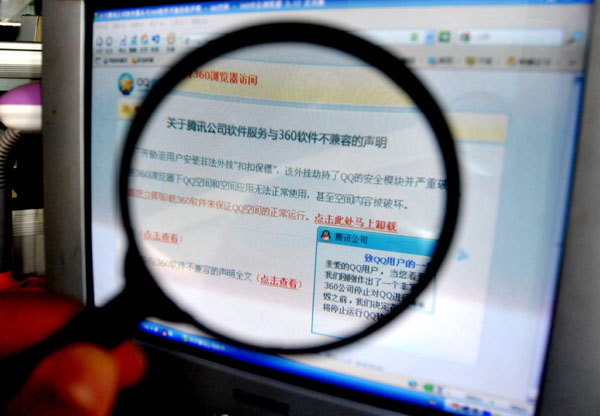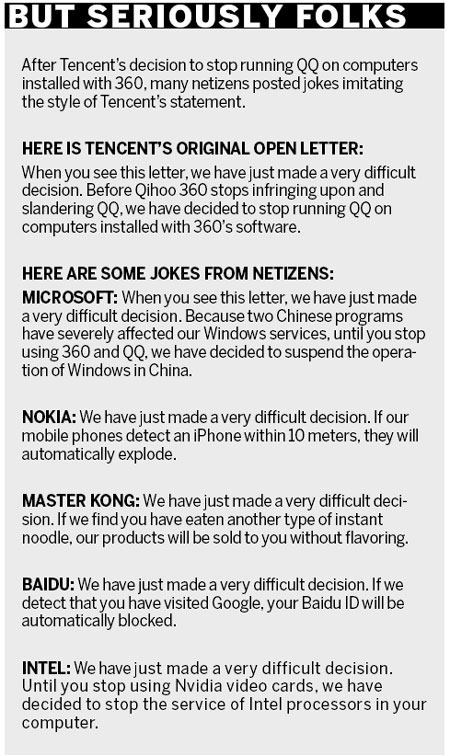Society
Netizens give QQ thumbs down
By Wang Huazhong (China Daily)
Updated: 2010-11-05 08:14
 |
Large Medium Small |
 |
|
Two pop-ups by Tencent on a netizen's computer in Fuzhou, Fujian province on Thursday say instant messaging software QQ is not compatible with the security software by Qihoo 360. [Zhang Bin / China Daily] |
BEIJING - More than half of Chinese netizens are willing to turn their backs on China's dominant instant messenger, QQ, after its owner Tencent Holdings Ltd pushed people to choose either QQ or a popular anti-virus program by Qihoo 360.
When asked "which program will you desert between QQ and 360 if you have to", more than 57 percent of 1.5 million participants voted to get rid of QQ, while 23 percent chose to sweep out 360, according to a poll on sina.com by 8:30 pm on Thursday. Another 19 percent were undecided.
| ||||
"We have just made a very difficult decision ... we have decided to stop running QQ on computers installed with 360's software," Tencent said in an open letter on Wednesday night.
Tencent said it felt sorry for the inconvenience to QQ users, but it would not change the decision unless 360 stops its "malicious slander".
"A new tag-on service run by 360 has affected functions of QQ. With 360 installed, we cannot guarantee the safety of our service," Tencent said in a pop-up on the screens of millions of QQ and 360 users on Wednesday night.
Qi Xiangdong, president of Qihoo 360, said Tencent's move was disastrous for China's Internet users, as it might lead to a large outbreak of viruses.
"Our 360 software is eliminating about 60 million Trojan horses daily for Chinese Internet users. If they uninstall it, the scale of virus attacks will be beyond imagination," Qi said.

On Wednesday night, 360 also released an open letter, calling on netizens to boycott QQ for three days to protest Tencent's attempt to "kidnap" users' interests.
The war between Tencent and 360 started in late September when Tencent upgraded its security related software, threatening 360's market share. After that, 360 alleged QQ was secretively scanning users' computers and leaking their private information. Then 360 offered a new service to prevent privacy leaks, and Tencent has since accused 360 of slander and foul play.
Regardless of who should be blamed for turning users' computers into a battlefield, users were more worried about saying goodbye to one of their programs.
"My brothers and sisters use QQ, my colleagues and classmates use QQ, even my clients do business with us through QQ. I don't like QQ's threat but I just can't stop using it," said 32-year-old Fan Qicheng, salesman at a State-owned company that has installed 360's free anti-virus software.
But Huang Min, a white-collar worker in Nanjing, said she will choose 360 and turn to MSN, a similar instant messaging software, if necessary.
"Many of my QQ friends are also on my MSN. It won't be much trouble," she said. "But 360 is important to my computer safety."
Chen Jinqiao, deputy chief engineer of the China Academy of Telecommunication Research under the Ministry of Industry and Information Technology, told China Daily on Thursday that the ministry has stepped in to mediate.
Many netizens also reported on Thursday that the two programs can still run at the same time on their computers, though others complained they conflict with each other.
On Thursday, other software companies even released "mediation" programs that enable QQ and 360 to run at the same time.
Tencent's public relations department said on Thursday that the company does not think the dispute will cause a loss of users, saying more than 116 million users logged on at the same time on Wednesday night - exceeding the second quarter's best of 109.4 million.
On the same day, 360 said in an e-mailed reply to China Daily that its security and browser software have seen a "slight increase" since the dispute started.
However, many netizens complain the fight between the two software giants has harmed their rights.
About 80 percent of the 1.5 million respondents polled on sina.com agreed with the statement that "the two companies were fighting for their own interests and not taking users' interests into account".
Zhu Wenqi, a professor in human rights from Renmin University of China, said the two companies were apparently using the privacy issue as an excuse to achieve their commercial goals.
Liu Jifeng, a professor in anti-monopoly from the China University of Political Science and Law, said companies must collect evidence before accusing each other of stealing and commercializing users' private information.
|
Nasty battles nothing new DAIRY This October, An Yong, a manager at Mengniu Dairy, was arrested by police in Hohhot of North China's Inner Mongolia autonomous region. He was suspected of planning a smear campaign against another milk manufacturer, Yili Group, in July this year. There had been online posts and media reports that some dairy products from Yili could cause early sexual development in children. Mengniu later released a statement on its website, saying Yili had spent more than 5.9 million yuan ($884,000) to hire a public relations company to launch a malicious campaign against Mengniu from 2003 to 2004. BREWING The 21st Century Business Herald reported that in April and May dozens of salesmen from the Yanjing Beer Group and China Resources Snow Breweries Co Ltd engaged in two gang fi ghts in Beijing because the former bought out the later's drinks from retailers so customers could not buy them. China Resources Snow Breweries Co Ltd reportedly did the same thing to Yanjing Beer Group in Central China's Wuhan city. TELECOMMUNICATIONS Media reports this year said that the regional company of China Mobile in South China’s Guangdong province bribed university leaders and teachers to expand its market share at universities. Its marketing plan included free trips to the Expo 2010 Shanghai. Takungpao newspaper also reported that in 2009, police caught four thieves stealing electric cable. They were later found to be employees of China Mobile in Yan’an city of Northwest China’s Shaanxi province. Their behavior resulted in a communication outage of more than seven hours for about 2,100 China Telecom users. And in December the same year, police reportedly found that the communication facilities of China Mobile in one residential district in Shanghai were purposely destroyed, which led to a communication interruption of more than six hours in the aff ected area. Further investigation revealed those responsible were from China Telecom’s Shanghai offi ces, according to the Oriental Outlook. DRINKING WATER According to a report by Oriental Outlook, in 2008 two spies slipped into the water plant of Master Kong in Hangzhou of East China’s Zhejiang province to take photos, but were caught by the security guard. Soon after that, an online post claiming that Master Kong’s mineral water was actually tap water was widely spread. The scandal reportedly led to a loss of 30 million yuan for Master Kong that year. Media reports said in September that one of the spies, Wu Chaochao, was a deputy manager of an advertising agency in which Nongfu Spring Co, a bottled water producer, has a controlling share. |
Chen Limin and Xinhua contributed to this story.


